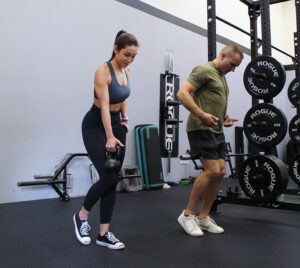Stay up to date on current research into the science behind exercise, building muscle, and recovery. Intersted in learning more about the beneifts of training? Checkout our list of go-to resources followed below by some of the questions we hear most often. Don’t see an answer to your question? Sign-up for your Free Personal Training Session today and get the answers you are looking for.
Online Resources
Frequently Asked Questions
Building muscle is a gradual process that typically takes several weeks to months, depending on various factors such as genetics, diet, exercise routine, and consistency. Beginners might notice changes in muscle size and strength within 8 to 12 weeks of a structured resistance training program. However, more significant muscle hypertrophy usually becomes evident after three to six months of dedicated training. It’s essential to combine resistance exercises with a high-protein diet and adequate rest to maximize muscle growth.
For those who have been training for a longer period, progress might slow down due to reaching closer to their genetic potential. Progressive overload, where you gradually increase the weight or resistance in your workouts, is crucial for continuous muscle development. Additionally, muscle growth can be influenced by factors such as age, gender, and overall health. While younger individuals may build muscle faster due to higher levels of growth hormones, older adults can still make substantial gains with appropriate training and nutrition.
We take the time to fit you with the ideal trainer whether you’re looking to build strength, improve endurance, lose weight, or enhance athletic performance.
We never pay commmissions on signing up for personal training sessions. Unlike a lot of gyms, we do not have a hard pressuer sales environment.
Our diverse team of trainers is equipped with the expertise and experience to tailor a personalized training program specifically for you. A Portland Personal Training, you’re not just investing in a workout session; you’re investing in a supportive partnership dedicated to helping you achieve your fitness goals efficiently and effectively.Our trainers are not only knowledgeable in exercise science and techniques but also passionate about empowering and motivating individuals to reach their fullest potential. Just check out our reviews!
With their guidance, encouragement, and unwavering support, you’ll not only see physical results but also experience a transformative journey towards a healthier and happier lifestyle.
Lifting weights does not automatically result in a bulky physique for most people, especially women. The degree of muscle growth depends on various factors including genetics, hormone levels, and training intensity. For women, lower levels of testosterone compared to men make it much harder to achieve a bulky appearance. Instead, weightlifting helps in building lean muscle, which can lead to a toned and defined look rather than bulkiness.
Men are more likely to gain noticeable muscle mass due to higher testosterone levels, but achieving a significantly bulky physique requires a dedicated and intense training regimen, often combined with a surplus of calories and specific dietary supplements. Most individuals lifting weights for general fitness or aesthetic goals will develop a stronger, leaner, and more sculpted body rather than becoming excessively muscular.
The best order of exercises in a workout typically follows the principle of performing compound movements before isolation exercises. Compound exercises, such as squats, deadlifts, bench presses, and pull-ups, work multiple muscle groups simultaneously and require more energy and coordination. By performing these exercises first, you can lift heavier weights and stimulate more muscle growth since your muscles are fresh and not fatigued.
After completing compound movements, you can move on to isolation exercises, which target specific muscles, such as bicep curls, tricep extensions, or leg curls. This approach ensures that you can fully exhaust the targeted muscles without compromising form or risking injury due to fatigue from compound exercises. Additionally, it’s often recommended to prioritize larger muscle groups like legs, back, and chest before smaller ones like arms and shoulders to maintain overall balance and prevent muscular imbalances.
While working on your feet all day does involve physical activity and can contribute to overall energy expenditure, it is not the same as structured cardiovascular exercise. Cardio workouts, such as running, cycling, or swimming, are specifically designed to elevate your heart rate and improve cardiovascular fitness. The intensity and duration of these activities are typically higher and more consistent compared to the incidental movement experienced during a workday.
Standing or walking throughout the day can have positive health benefits, such as improved circulation and reduced sedentary time, but it is usually not sufficient to significantly enhance cardiovascular health. To achieve the benefits associated with cardio exercise, including improved heart health, increased stamina, and better calorie burning, it’s important to engage in moderate to vigorous aerobic activity for at least 150 minutes per week, as recommended by health guidelines.
Sleep is a critical component of muscle recovery and overall fitness. During sleep, the body undergoes numerous restorative processes that are essential for muscle repair, growth, and overall recovery. The majority of muscle repair and growth occurs during deep sleep stages when the body releases growth hormone, which is pivotal for tissue growth and muscle repair. Inadequate sleep can impair these processes, leading to slower recovery times, decreased performance, and an increased risk of injury.
Moreover, poor sleep quality can negatively impact hormone levels, including increased cortisol (a stress hormone) and decreased testosterone, both of which can hinder muscle growth and recovery. Ensuring 7-9 hours of quality sleep per night can enhance athletic performance, improve muscle recovery, and optimize the benefits of your workout routine. Prioritizing good sleep hygiene, such as maintaining a regular sleep schedule and creating a restful sleep environment, is vital for anyone looking to build muscle effectively.
Hydration plays a vital role in muscle building and overall physical performance. Water is essential for various physiological processes, including nutrient transport, temperature regulation, and joint lubrication. Proper hydration ensures that muscles are well-nourished and can perform optimally during workouts. Dehydration can lead to muscle cramps, fatigue, and reduced strength, which can impair your ability to complete intense training sessions and hinder muscle growth.
Additionally, staying hydrated supports efficient protein synthesis, the process by which the body builds new muscle tissue. Water is also crucial for maintaining cellular functions and the balance of electrolytes, which are important for muscle contraction and relaxation. To maximize muscle building and recovery, it’s important to drink enough water before, during, and after workouts, as well as throughout the day. The general recommendation is to consume at least 8-10 cups of water daily, though individual needs may vary based on factors like activity level, climate, and body size.








